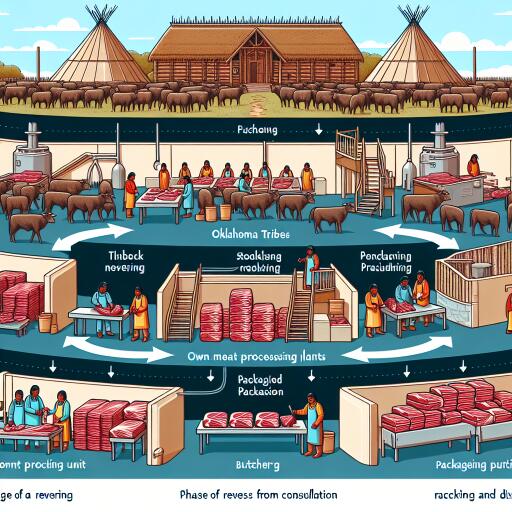In the heart of Oklahoma, amidst the sprawling prairies of Hominy, the Osage Nation is pioneering a movement that brings a refreshing change to the longstanding narrative of meat processing consolidation in the United States. This initiative, led by tribal communities, is not just about securing sources of protein but resurrecting a sense of independence and sustainability through the establishment of their own meat processing plants.
Cole McKinney, plant manager at Butcher House Meats, exemplifies the hands-on challenges and the spirit of resilience emblematic of this movement. The facility, owned and operated by the Osage Nation government, epitomizes the tribe’s efforts to reclaim control over meat processing – a sector that has over the years dwindled in diversity due to rampant consolidation. Specializing not just in cattle but highlighting bison as a significant part of their processing, the Osage Nation underpins the importance of these animals both economically and culturally.
The challenges posed by consolidation have been acutely felt across the nation, where the diminution of small to medium-sized meatpacking plants has not just stifized competition but significantly impacted profits for independent ranchers. The tribal communities, however, have felt a sharper sting, witnessing closures at nearly double the national rate since 1990. For a state like Oklahoma, which boasts a substantial Native American population and stands prominently in the beef sector, the closures have been a significant blow, especially within tribal areas.
Yet, in the face of adversity, the Osage, alongside other tribes such as the Cherokee, Muscogee (Creek), and Quapaw Nations, have embarked on a journey to reverse this trend. Through the establishment of USDA-inspected processing facilities, they’re not only securing a lifeline for local ranchers but are also ensuring that their communities have access to locally-sourced, quality meat. The impact is two-fold, serving as a critical source of employment and as a means to fortify food sovereignty within these tribal nations.
The drive towards establishing these facilities was given impetus by the supply chain disruptions experienced during the early days of the COVID-19 pandemic. For some tribes, federal pandemic relief funds provided the necessary capital for initial construction, marking the beginning of a new chapter in tribal self-reliance and economic diversification. These plants, while serving the tribes’ needs by processing meat from their ranches for various community programs and commercial ventures, also extend their services to local ranchers, filling a gap left by the closure of numerous processing facilities over the years.
This renaissance of tribal meat processing is not just a narrative of economic revitalization but a testament to the resilience and ingenuity of these communities. By stepping into the void left by the consolidation of the meatpacking industry, these tribes are not just securing a source of sustenance but are rekindling a connection to their land and their heritage.
Moreover, the success of these tribal-owned facilities represents a beacon of hope and a model for sustainable operation, potentially inspiring other communities across the nation to follow suit. As these facilities continue to grow and serve their communities, they underscore a broader movement towards food sovereignty, sustainability, and the empowerment of Indigenous peoples.
This revival of tribal meat processing in Oklahoma embodies the spirit of resilience and independence, offering a hopeful outlook for the future of food sovereignty among Native American communities. It’s a testament to what can be achieved when communities come together to reclaim control over their food systems, ensuring not just the availability of locally sourced, nutritious food but also safeguarding a way of life for generations to come.
